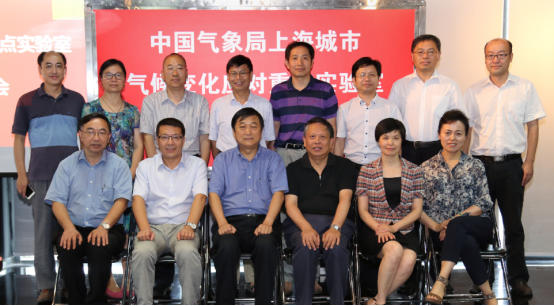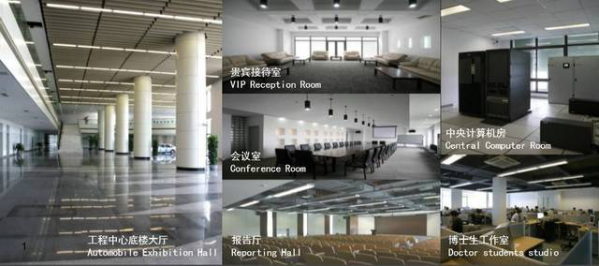1) Key Laboratory of Modern Engineering Survey, National Surveying and Mapping Geographic Information Bureau
On October 11, 2004, the Key Laboratory of Modern Engineering Survey, National Surveying and Mapping Geographic Information Bureau was officially launched thanks to the joint efforts of Tongji University and Shaanxi Bureau of Surveying and Mapping Geographic Information. The Academic Committee was chaired by CHEN Junyong, academician of Chinese Academy of Sciences (CAS) and co-chaired by NING Jinsheng, academician of Chinese Academy of Engineering (CAE) and CAS academician XU Houze.
Aiming at the international frontier of modern engineering surveying disciplines to better serve key infrastructure projects, the Laboratory actively explores new fields of research and application in the context of unprecedented opportunities for economic development in Shanghai and China. In addition, the Laboratory is also committed to applying new technology to the theory and practice of engineering survey to enable it to serve a broader array of fields. In recent years, the Laboratory has made remarkable progress in structural adjustment, scientific research, personnel training and international exchange.
The research fields of the Laboratory are as follows:
Ø Special Engineering and Industrial Measurement;
Ø Engineering Application and System Integration Of GPS/GALILEO System;
Ø Engineering Application of Digital Close-Range Photogrammetry and Laser Scanning Technology;
Ø Urban Location.
2) Key Laboratory for Wind Resistance of Bridges of the Ministry of Transport
Supported by the Bridge Wind Resistance Laboratory of Department of Bridge Engineering and the Wind Tunnel Laboratory of State Key Laboratory of Disaster Reduction in Civil Engineering of Tongji University, the Key Laboratory for Wind Resistance of Bridges of the Ministry of Transport was established in the context ofChina’s booming industry of long-span bridges. The Laboratory conducts research in the theory and engineering application of wind-resistant design of long-span bridges, focusing on the following areas:
Ø the basic theory of bridge aerodynamics;
Ø the basis of application of wind-resistant bridge engineering;
Ø the physical and numerical testing technology of wind resistance of bridges;
Ø the performance and durability of bridge components under wind effect.
The Laboratory is poised to be an international center for training high-level talents, engaging in high-level research and high-tech industrialization.
In the past three years, we have actively carried out basic research on wind-induced vibration of bridges, key wind-resistant technologies for large-span and multi-span bridges, forward-looking research on numerical simulation of wind-induced disasters, and related pro bono research on field measurements and numerical simulation of typhoons and gusts.
The Laboratory has achieved a number of innovative breakthroughs and gained rich experience in the theory of wind-resistant design, wind tunnel test technology and actual bridge engineering for long-span bridges. It has made theoretical and technical preparations for the construction of national key projects such as Qiongzhou Strait Project, Bohai Bay Project, Taiwan Strait Connection Project and the long-span bridges needed in the construction of national expressway network.
3) Key Research Section of State Administration of Traditional Chinese Medicine
During the "Tenth Five-Year Plan" (2001-2005) and the "Eleventh Five-Year Plan" (2006-2010) period, the central government of China launched an initiative of "Research on the Rules and Modes of Inheritance of Famous Doctors of Traditional Chinese Medicine (TCM)". The preliminary results defined the traits, inheritance modes and problems of successful TCM talents, shedding light on measures to address this issue. In this context, the Traditional Chinese Medicine Master Inheritance Talent Training Project (hereinafter referred to as the "Master Class") undertaken by the Research Section is a pilot project approved by State Administration of Traditional Chinese Medicine for training outstanding TCM talents. Building on the experience in the past four years, we explore a brand-new training mode of famous TCM masters that combines university education with apprenticeship tutoring. This paves way for the standard of talent development and inheritance of TCM masters.
While studying the elements and rules of famous TCM masters, we explore the innovative mode of inheritance and cultivation of TCM masters in our quest for a standard and long-term mechanism of TCM talent development. It is expected to provide input for relevant competent authorities in their formulation of relevant policies and the innovative system of inheritance and cultivation of famous TCM masters.
4) Key Laboratory of Cities’ Mitigation and Adaptation to Climate Change in Shanghai, China Meteorological Administration (CMACCS)
To facilitate sustainable economic and social development with meteorological service, China Meteorological Administration and Tongji University formally signed a cooperation agreement at the end of 2011. It was noted in the agreement that an official cooperation mechanism based on consolidating the existing cooperation between the two parties will expectedly create synergy in a comprehensive cooperation model and contribute to the educational reform and research excellence of Tongji University.
The Laboratory aims at capturing the international trend of climate change response and building on the future sustainable development of cities. Focusing on the challenges of current climate change to urban construction and development, the Laboratory actively explores interdisciplinary cooperation approaches that can integrate meteorological authorities with key disciplines of universities and respond to the key issues of urban climate change response. The Laboratory will grow into an urban climate change response center and a platform for international exchange and cooperation of international importance.

5) National Engineering Laboratory of New Energy Vehicles and Power Systems
The National Engineering Laboratory of New Energy Vehicles and Power Systems is one of the key engineering laboratories planned during the 11th Five-Year Plan period (2006-2010) of China. It is also the main engineering laboratory for research on new energy vehicles and power systems technology and the service platform for industrialization of new energy vehicle technology achievements in China.
The National Engineering Laboratory for New Energy Vehicles and Power Systems is committed to building a research and development base for new energy vehicles and power systems with international first-class scientific research facilities and talents, and a source of technological innovation for new energy vehicles in China. The Laboratory focuses on the following four fields:
Ø Integration and Matching Technology of New Energy Vehicles and Power Systems;
Ø New Energy Vehicle and Power System Control Technology;
Ø New Energy Vehicle and Power System Test Technology;
Ø New Energy Vehicle Fuel Supply, Conversion and Control Technology.
Based on the principle of "optimizing and integrating resources and improving platforms", the Laboratory addresses the needs of China's automobile industry for new energy vehicles and power system technologies by focusing on the key technological breakthroughs during the period. These achievements include integration and matching of new energy vehicles and power systems, control of new energy vehicles and power systems, testing of new energy vehicles and power systems, fuel supply, conversion and control of new energy vehicles. Now six testing platforms are being implemented:
Ø an automotive power transmission system test bench,
Ø an electromagnetic compatibility test bench,
Ø an FCE environmental bin,
Ø a durable rotating drum for vehicles,
Ø an engine calibration system,
Ø an on-board vehicle performance test system.
The Laboratory has disseminated fuel cell vehicle power system platform and key component technologies to fuel cell minicars, fuel cell buses, pure electric minicars, hybrid cars and buses. Our technology has benefited from dissemination. An independent intellectual property system for new energy vehicles and power systems has also been formed. The core technological achievements have been applied to the 2010 World Expo Shanghai and the 2010 Asian Games in Guangzhou. The Laboratory has established China's first comprehensive test specification for the power system and key components of fuel cell cars, and has drafted 18 international, national or industrial standards related to new energy vehicles and power systems, including 1 international standard and 15 national standards.
The research team composed of resourceful staff and enterprising youths has a system that serves the basic technical research and industrial development of new energy vehicles and power systems. Large-scale application of new energy vehicles and power systems in Shanghai and the industry can benefit from it, which in turn contribute to sustainable development of China’s automotive industry.
